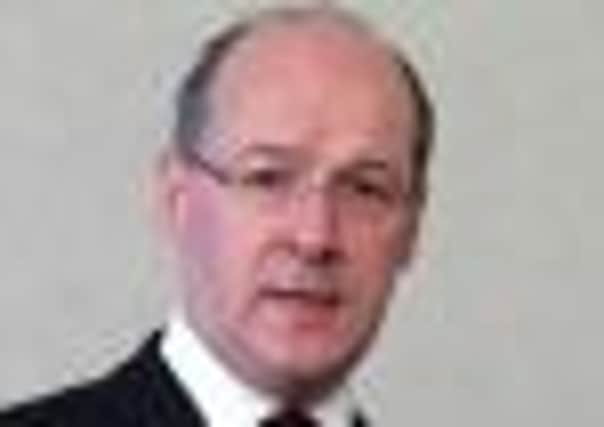Leaders: Long, weary road ahead in recovery from recession


That is the bleak conclusion from the latest economic forecast from the respected Fraser of Allander Institute.
It has slashed its forecast for economic growth this year from 0.9 per cent to 0.4 per cent – a level that will feel very much like a continuation of recession. It predicts unemployment will rise by a further 34,000 to reach 265,000 – or 9.8 per cent – at the end of this year. On both measures, Scotland is set to perform worse than the UK as a whole.
Advertisement
Hide AdAdvertisement
Hide AdThis is proving to be the longest period of recovery from recession for a generation. Indeed, it may take more than six years before output in Scotland re-ascends its pre-crisis peak. The institute believes this could happen in the third quarter of 2014 – a longer period of recovery than that recorded for the Great Depression of the 1930s. Its depth, however, is nowhere near as severe. But for the young unemployed it is, as the report says, “a personal and social tragedy” as well as an economic one.
The report is testimony to the size and gravity of the debt and deficit overhang. It is not only public finances that have to be brought back from chronic levels of indebtedness but personal balance sheets too, after a decade and more of excess. For the moment, household incomes and spending power have been badly squeezed and this has throttled down consumer spending.
The biggest problem after the debt legacy is lack of confidence, exacerbated by the sovereign debt crisis in the eurozone.
. However, the institute notes that the weakening in growth in the economy towards the end of last year does not appear to be as bad as many feared. And there are some encouraging if tentative signs of recovery in recent weeks. Both the services and manufacturing Purchasing Managers’ Indices showed a stronger than expected performance in January. Some life is coming back to consumer spending, helped by falling inflation. And there is a notable, if temporary, pick up in mortgage approvals.
There is no doubting the bleakness of the picture at the macro level and the difficulty in getting a rebalancing towards an export-led recovery under way. At the micro level, however, many Scottish companies are continuing to do well. Only this week Weir Group has announced a doubling in profits two years earlier than planned, Investment firm Braveheart has won substantial new contracts, and Vertu, the car dealership that takes in Scottish brand Macklin Motors, has seen group sales push through £1 billion.
But we need more – many more – of those success stories at street level before we can be sure a recovery really is under way.
Each-way bet safest for Salmond
That the attack on Alex Salmond’s promise to consider putting a “devo-plus” option to the people of Scotland in his promised independence referendum comes from two of his harshest critics – former deputy leader Jim Sillars and former leader Gordon Wilson – does not diminish the impact of their criticism of the First Minister’s strategy, which we revealed yesterday.
Given that opinion poll evidence shows Scots favour greater devolution over separation, Mr Sillars’ comment that devo-plus rings “the death bell for independence” will resonate with the dormant fundamentalist wing of the SNP. Equally, Mr Wilson’s warning that devo-plus could result in Scottish troops fighting wars entered into by the UK government is a statement of the obvious truth.
Advertisement
Hide AdAdvertisement
Hide AdIt is likely, however, this is not how Mr Salmond sees it. Known for his love of the sport of kings, we can be sure the political gambler in the First Minister will have calculated that there are very high stakes in having just a straight vote on independence. He could easily lose his shirt, not to mention his political credibility and the chance of leaving a lasting historical legacy, on a straight Yes/No vote.
As an alternative, Mr Salmond must prefer the each-way bet of including devo-plus on the ballot paper. If Scots voters back this scheme – which involves substantial devolution of income tax, corporation tax and North Sea oil to Holyrood – the First Minister will claim to have won more powers for Scotland than ever envisaged under devolution while keeping the precious independence flame alight, ready to burn more brightly in the future.
Murdoch sticks by his favourite ex-editor
Despite what the official government statement said, we doubt whether the discredited, though still powerful, media mogul and the man he says is the most brilliant politician in the UK spent much time yesterday discussing media ethics. Rupert Murdoch’s Bute House tête-a-tête with Alex Salmond had, we suspect, far more to do with the First Minister’s wish to win support for independence from the tycoon’s Sun newspaper than debate the issues thrown up by the Leveson inquiry.
Yet there was so much they could have talked about. The meeting was held on the day the Leveson inquiry was told that Rebekah Brooks’s phone was hacked twice a week by colleagues at the Murdoch-controlled sister paper, the News of the World, while she was editing the Sun. Hacks hacking hacks might be expected to evince sympathy for Ms Brooks, but Lord Leveson is unlikely to spare her, or newspapers generally, on the basis of this sob story.
Equally unlikely to sway the judge, or the public, will have been the media magnate’s defence of Mrs Brooks’s loan of a horse by Scotland Yard. He tweeted that people were complaining about Mrs Brooks “saving an old horse from the glue factory”. His defence of his favourite ex-editor shows loyalty – perhaps to save her from the journalistic equivalent of the glue factory?